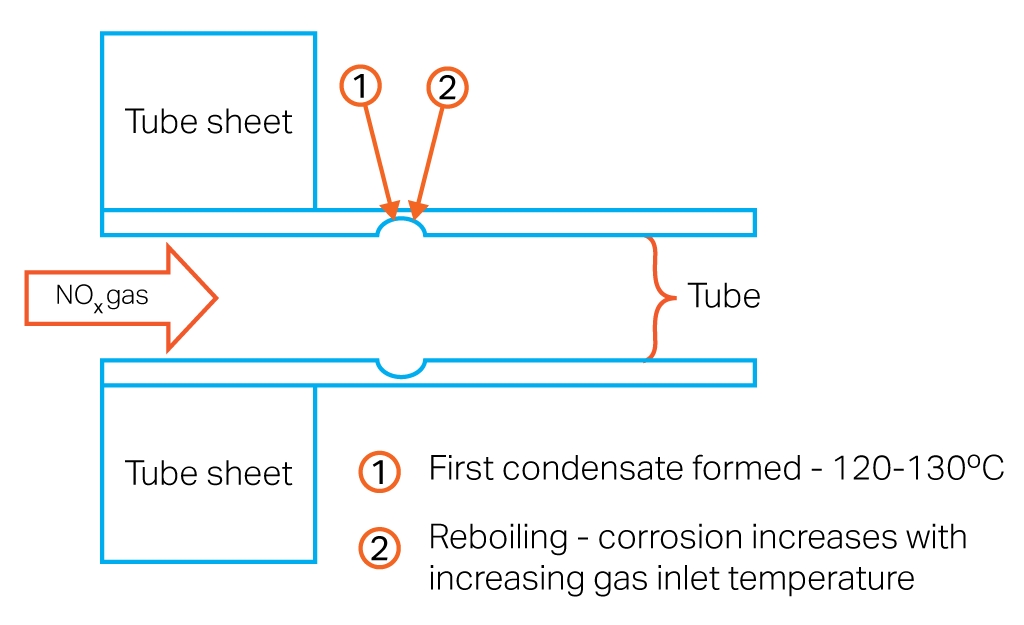Learn about our risk-reducing nitric acid range.
Quality safeguards productivity
To maintain good profitability in today’s competitive nitric acid market, productivity needs to be carefully monitored to minimize downtime. Optimizing your process with the right tube material in the heat exchanger, for example, can minimize the risk of corrosion in the re-boiling zone. It can also prevent stress corrosion cracking due to chlorides in the cooling water and more. The right selection can help to avoid unscheduled stops due to plugging or even replacement of the entire heat exchanger unit.
Meeting corrosion challenges
When dealing with higher temperatures and concentrations of nitric acid, you may notice some corrosion problems in the hot inlet of the cooler/condenser or tailgas preheater. As shown in the diagram below, when nitrogen oxide (NOx) gases condense at temperatures of 120-130°C and the hot droplets reboil, corrosion can be initiated. Re-tubing from 304 or 304L to a higher alloy material such as Alleima® 2RE10 can prevent this and safeguard operations at about 20% higher temperature. This is due to the material’s low impurity levels and higher chromium content, which increases corrosion resistance.
Corrosion challenges may occur in the inlet of shell and tube heat exchangers
Zirconium-level performance at an affordable price
As described, corrosion in the re-boiling zone can easily decrease the efficiency and productivity of any shell and tube heat exchanger. The good news is that we will soon be able to offer you a truly superior solution to combat this: Alleima bimetallic tube – with an inner tube made of zirconium, one of the most corrosion-resistant metals available. The inner tube is mechanically bonded to the outer tube, which is made of Alleima® 2RE10*. The inner liner prevents corrosion while the outer tube ensures structural integrity and positive welding properties. The bimetallic tube will also enable the use of a stainless steel tube plate or even re-tubing of an entirely stainless steel heat exchanger. And since welding is purely stainless-to-stainless, no post-weld heat treatment will be necessary.
* Note: If you require a bimetallic solution with an outer tube material other than Alleima® 2RE10, please get in touch with us.
Corrosion performance of zirconium tube in nitric acid production

The beauty of a bimetallic tube is that you get all the benefits of pure zirconium in the inner wall, without its considerably higher price tag. You also gain the positive metallurgical properties of our well-proven Alleima 2RE10* tube. The benefits of zirconium can be seen in the diagram below, which shows its tough corrosion resistance. In short, Alleima will soon be able to offer you the best of two metallurgical worlds. Product development of this new bimetallic tube is ongoing and expected to be completed shortly. If this sounds interesting to you please contact us to receive further updates or more detailed information.
Download the specification for bimetallic tubes: Alleima® 2RE10/ZR702.
Solution-based performance
Every production facility has its own challenges and requirements. What are yours? Our skilled R&D experts and technical sales force are always on hand to support you throughout the blueprint process of building or refurbishing. When specifying the right stainless steel for your designs, you need to balance the need to meet key criteria such as corrosion resistance, cost performance, and mechanical properties. Replacement and maintenance costs for each material, including potential costly production losses due to shutdowns, need to be factored in.
Extend your equipment lifetime
For example, it will always cost more to replace ASTM 304L tubing twice versus using a “modified” ASTM 310L material like Alleima® 2RE10 for long-term process performance. The diagram below shows how this material sustains or exceeds a minimal 0.1 mm/year corrosion rate at considerably higher temperatures than other grades – expanding its operational window. In short, this austenitic material is designed to last considerably longer.
Alleima® 2RE10 offers 20% higher corrosion resistance at 60% concentration

Setting a higher standard
As you know, technical standards are not scientifically exact – they are more values within a certain range. To be on the safe side and live up to our quality reputation, Alleima always produces materials according to the top values within a standard. We call it “setting the standard within the standard”. By always being in the upper range of a technical standard, we know our customers can achieve nonstop production with fewer unexpected productivity losses and longer cycles between scheduled maintenance.
Swedish high-quality steel
You might have heard the expression “Swedish high-quality steel” before. Naturally we think it’s true and we are proud to be a part of this premium steelmaking legacy. We started our steel production more than 150 years ago and continue to fine-tune our production expertise and materials knowledge. Today, more than 2700 people within our group R&D organization are devoted to meeting and exceeding your expectations. Our production is global, but one thing remains: the initial melt is always made in Sandviken, Sweden and each batch is fully documented and traceable.
Industry experience is key
For more than 60 years Alleima has been solving material challenges for the global urea and nitric acid industries – leading to a vast reservoir of knowledge. Combining that knowledge with pioneering the development of new or improved materials continuously helps our customers to boost their productivity and cut costs that arise due to material failures.